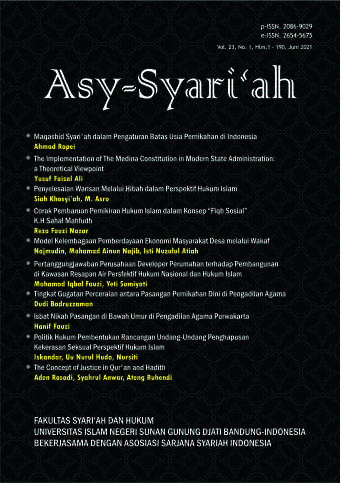Artificial Intelligence Use in the Issuance of Inheritance Fatwas: Evaluating GPT-3.5 Compliance with Islamic Legal Principles
DOI:
https://doi.org/10.15575/as.v26i2.37666Keywords:
Fatwas, Islamic Inheritance, Artificial Intelligence, GPT-3.5Abstract
Abstract: The aim of this study was to evaluate the compliance of GPT-3.5 to Islamic legal principles in issuing fatwas on inheritance distribution. The focus was on the economic impact of artificial intelligence (AI) on social welfare development and comparison with the potential of GPT-3. Qualitative and mixed methods were used to collect data from different sources, including books, journal articles, reports, conference papers, and jurisprudence academies. A comprehensive analysis was conducted on the significance of fatwas, their historical development, traditional methods, and the role of technology, including AI and natural language processing, within the Islamic context. Moreover, data were collected on inheritance cases associated with issues such as murder, religious differences, heirs of the Qur'an, residual heirs, distant relatives, exceptions, al-Minbariyyah, al-Radd, al-Umariyyah, al-Akdariyyah, missing persons, and multiple deaths. The findings showed that the ability of GPT-3.5 to issue fatwas was consistent with the principles of Islamic law as well as its potential to offer faster response times compared to traditional methods. However, GPT-3.5 showed inconsistencies, specifically in issuing fatwas related to inheritance distribution in cases related to murder, religious differences, heirs of the Qur'an, remaining heirs, distant relatives, exceptions, al-Minbariyyah, al-Radd, al-Umariyyah, and al-Akdariyyah. This study contributes to the law and policymaking in global Muslim countries with a focus on the proper and correct use of technology in Islamic law issues in the contemporary era.
References
Abdille, Hossamdin Mustafa and Yunus. “Al-Fatawa Al-Shari’a Abra Wasail Al-Ilam At-Tanzania: Waqi’uha Waatharuha.” Sumait University Journal, 10, no. 1 (2022): 14–15. https://doi.org/10.63104/suj.v.i.48.
Abdulrahman, Manswab Mahsen. “Distribution of Estate in Islamic Law: A Case Study of Missing Person, Child in the Womb and Hermaphrodite.” Journal of Islamic Studies and Culture 8, no. 1 (2020): 31–41. https://doi.org/10.15640/jisc.v8n1a4.
Ahmad bin Hamdan Al-Harrani. Sifat Al-Fatwa Wa Al-Mufti Wa Al-Mustafti. Damaskus: Mansyurat Al-Maktab Al-Islami, 1380.
Downloads
Published
How to Cite
Issue
Section
Citation Check
License
Copyright (c) 2024 Manswab Mahsen Abdulrahman, Abdul Hafiz Musa Walusimbi

This work is licensed under a Creative Commons Attribution-ShareAlike 4.0 International License.
The author whose published manuscript approved the following provisions:
- Authors retain copyright and grant the journal right of first publication with the work simultaneously licensed under a Attribution-ShareAlike 4.0 International (CC BY-SA 4.0) License that allows others to share the work with an acknowledgment of the work's authorship and initial publication in this journal.
- Authors are able to enter into separate, additional contractual arrangements for the non-exclusive distribution of the journal's published version of the work (e.g., post it to an institutional repository or publish it in a book), with an acknowledgment of its initial publication in this journal.
- Authors are permitted and encouraged to post their work online (e.g., in institutional repositories or on their website) prior to and during the submission process, as it can lead to productive exchanges, as well as earlier and greater citation of published work (See The Effect of Open Access).






